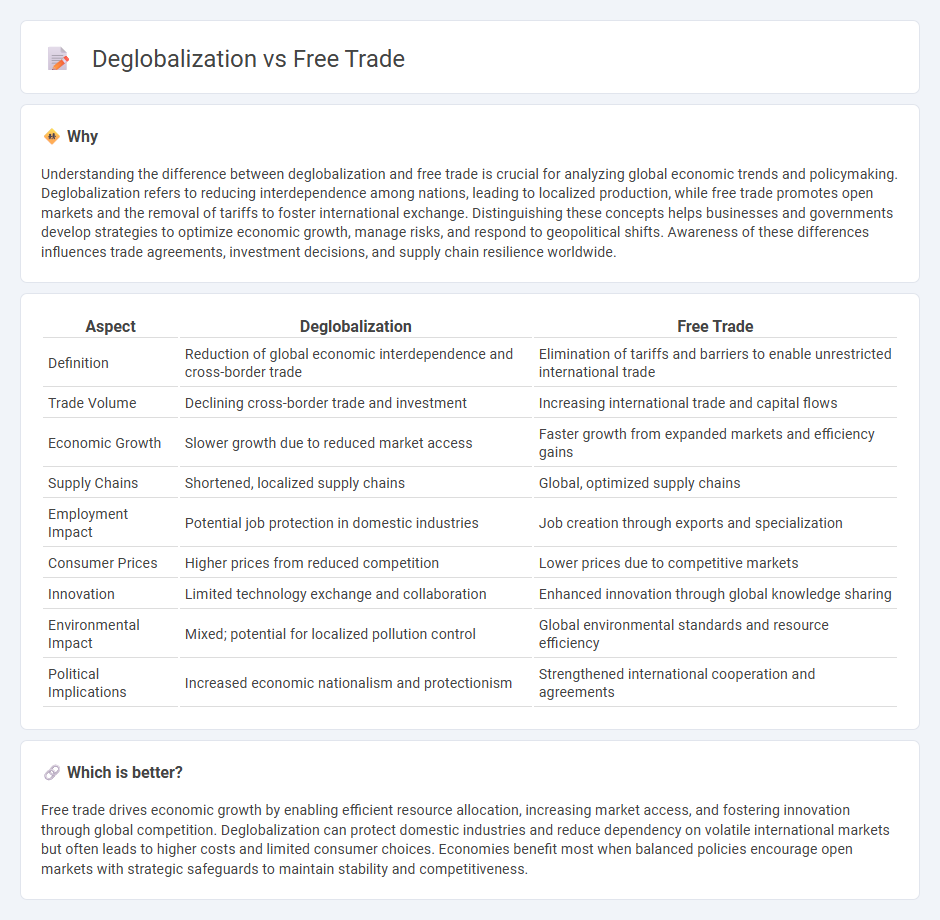
Deglobalization challenges the principles of free trade by emphasizing local production, supply chain resilience, and economic sovereignty to reduce dependence on international markets. While free trade promotes global economic integration, comparative advantage, and increased consumer choice, deglobalization seeks to mitigate risks associated with geopolitical tensions, supply disruptions, and protectionist policies. Explore deeper insights into how these contrasting economic strategies shape global markets and national policies.
Why it is important
Understanding the difference between deglobalization and free trade is crucial for analyzing global economic trends and policymaking. Deglobalization refers to reducing interdependence among nations, leading to localized production, while free trade promotes open markets and the removal of tariffs to foster international exchange. Distinguishing these concepts helps businesses and governments develop strategies to optimize economic growth, manage risks, and respond to geopolitical shifts. Awareness of these differences influences trade agreements, investment decisions, and supply chain resilience worldwide.
Comparison Table
| Aspect | Deglobalization | Free Trade |
|---|---|---|
| Definition | Reduction of global economic interdependence and cross-border trade | Elimination of tariffs and barriers to enable unrestricted international trade |
| Trade Volume | Declining cross-border trade and investment | Increasing international trade and capital flows |
| Economic Growth | Slower growth due to reduced market access | Faster growth from expanded markets and efficiency gains |
| Supply Chains | Shortened, localized supply chains | Global, optimized supply chains |
| Employment Impact | Potential job protection in domestic industries | Job creation through exports and specialization |
| Consumer Prices | Higher prices from reduced competition | Lower prices due to competitive markets |
| Innovation | Limited technology exchange and collaboration | Enhanced innovation through global knowledge sharing |
| Environmental Impact | Mixed; potential for localized pollution control | Global environmental standards and resource efficiency |
| Political Implications | Increased economic nationalism and protectionism | Strengthened international cooperation and agreements |
Which is better?
Free trade drives economic growth by enabling efficient resource allocation, increasing market access, and fostering innovation through global competition. Deglobalization can protect domestic industries and reduce dependency on volatile international markets but often leads to higher costs and limited consumer choices. Economies benefit most when balanced policies encourage open markets with strategic safeguards to maintain stability and competitiveness.
Connection
Deglobalization disrupts established global supply chains, reducing the flow of goods, services, and capital essential for free trade expansion. Free trade relies on interconnected markets and lowered trade barriers, which deglobalization challenges through protectionist policies and increased localization. The tension between these forces shapes economic growth, influencing international trade agreements and global market dynamics.
Key Terms
Tariffs
Tariffs play a crucial role in the debate between free trade and deglobalization, with free trade advocating for reduced or eliminated tariffs to enhance international market access and lower consumer costs. Deglobalization policies support higher tariffs to protect domestic industries, reduce dependence on foreign supply chains, and promote national economic resilience. Explore detailed impacts of tariff adjustments on global trade dynamics and economic strategies.
Supply Chains
Free trade fosters intricate global supply chains by minimizing tariffs and regulatory barriers, enabling companies to source components from multiple countries efficiently. Deglobalization trends disrupt these networks, prompting businesses to regionalize or localize production to mitigate risks like geopolitical tensions and supply interruptions. Explore comprehensive insights on how shifting policies reshape supply chain dynamics worldwide.
Protectionism
Protectionism involves government actions and policies that restrict international trade to protect domestic industries from foreign competition, often through tariffs, quotas, and subsidies. Free trade promotes minimal barriers, enabling countries to specialize and benefit from comparative advantage, while deglobalization reflects a retreat from global interconnectedness, increasing reliance on protectionist measures. Explore deeper insights on how protectionism shapes economic dynamics amid free trade and deglobalization trends.
Source and External Links
Free trade | Definition & Facts | Britannica Money - Free trade is a policy where governments do not discriminate against imports or interfere with exports through tariffs or subsidies, aiming for specialization, greater efficiency, and higher aggregate production in international trade.
Free Trade Agreements Help Center - Free trade agreements provide benefits like low or no duty access, stronger intellectual property protection, and increased competitiveness for exporters in large international markets.
Free Trade: Overview | EBSCO Research Starters - Free trade involves exchanging goods and services across borders without tariffs or regulations, promoting economic growth but also raising concerns about environmental and labor standards.
 dowidth.com
dowidth.com